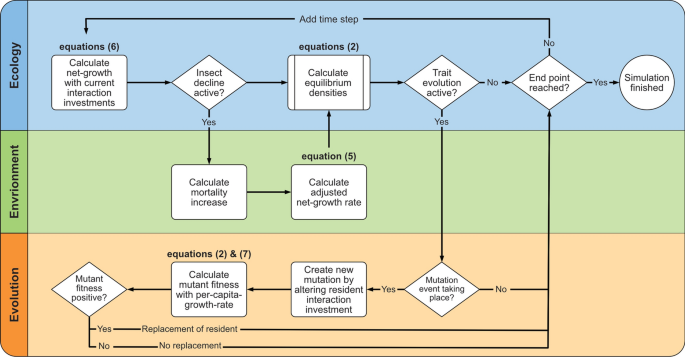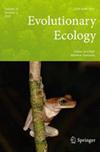两种共生系统的生态进化动力学:种群单侧下降触发联合相互作用撤资
IF 2.1
3区 环境科学与生态学
Q3 ECOLOGY
引用次数: 0
摘要
生态和进化动态之间的相互作用可以产生反馈,增强外部干扰并潜在地威胁物种的共存。例如,当面临传粉者减少时,植物可能会减少对昆虫传粉者的吸引(减少花或花蜜的产生),而更多地投入于独立性(增加自交或营养繁殖)。这种适应性反应以进一步威胁传粉者种群为代价,节省了植物资源。我们想知道,当考虑单侧种群下降时,这种自我强化反馈在两种共生系统中是在什么条件下发生的,如果考虑相互作用伙伴的共同进化,是否可以通过自我抑制反馈来抵消这种反馈。在建立数学模型的基础上,结合前人的研究发现,假设独立增长与相互投资之间存在凹形的分配权衡,在较宽的参数值范围内,所描述的人口加速下降模式都会发生。未受干扰的人口通常首先减少投资,然后迫使减少的人口也减少投资,转而支持其他能源。然而,如果未受干扰的伴侣的适应相对于环境衰退相对缓慢,减少了其撤资的速度,或者如果对相互作用的初始投资非常高,则可能发生种群减少的减速。我们的研究结果表明,如果要采取行动拯救濒危种群,不仅要考虑目标物种的进化,而且要考虑它们的相互作用伙伴的进化,以及它们之间的相互作用。本文章由计算机程序翻译,如有差异,请以英文原文为准。

Eco-evolutionary dynamics in two-species mutualistic systems: one-sided population decline triggers joint interaction disinvestment
Abstract The interplay between ecological and evolutionary dynamics can create feedback that reinforces external disturbances and potentially threatens species’ coexistence. For example, plants might invest less into attracting insect pollinators (decreased flower or nectar production) and more into independence (increased selfing or vegetative reproduction) when faced with pollinator decline. This adaptive response saves plant resources at the cost of further threatening the pollinator population. We ask under which conditions such self-reinforcing feedback occurs in two-species mutualistic systems when considering one-sided population decline and whether it can be counteracted by self-dampening feedback if co-evolution of both interaction partners is considered. Based on a mathematical model and in line with previous studies, we find that the described pattern of accelerated population decline occurs for a wide range of parameter values if a concave allocation trade-off between independent growth and interaction investment is assumed. The undisturbed population typically disinvests first, which then forces the declining population to also disinvest, in favour of other energy sources. However, a decelerated population decline can occur if the adaptation of the undisturbed partner is relatively slow compared to environmental decay, reducing the speed of its disinvestment, or if the initial investment into the interaction was very high. Our results suggest that if actions are taken to save endangered populations, not only the evolution of the target species but also of their interaction partner, as well as the interaction between them should be considered.
求助全文
通过发布文献求助,成功后即可免费获取论文全文。
去求助
来源期刊

Evolutionary Ecology
环境科学-进化生物学
CiteScore
3.00
自引率
5.30%
发文量
70
审稿时长
3 months
期刊介绍:
Evolutionary Ecology is a concept-oriented journal of biological research at the interface of ecology and evolution. We publish papers that therefore integrate both fields of research: research that seeks to explain the ecology of organisms in the context of evolution, or patterns of evolution as explained by ecological processes.
The journal publishes original research and discussion concerning the evolutionary ecology of organisms. These may include papers addressing evolutionary aspects of population ecology, organismal interactions and coevolution, behaviour, life histories, communication, morphology, host-parasite interactions and disease ecology, as well as ecological aspects of genetic processes. The objective is to promote the conceptual, theoretical and empirical development of ecology and evolutionary biology; the scope extends to any organism or system.
In additional to Original Research articles, we publish Review articles that survey recent developments in the field of evolutionary ecology; Ideas & Perspectives articles which present new points of view and novel hypotheses; and Comments on articles recently published in Evolutionary Ecology or elsewhere. We also welcome New Tests of Existing Ideas - testing well-established hypotheses but with broader data or more methodologically rigorous approaches; - and shorter Natural History Notes, which aim to present new observations of organismal biology in the wild that may provide inspiration for future research. As of 2018, we now also invite Methods papers, to present or review new theoretical, practical or analytical methods used in evolutionary ecology.
Students & Early Career Researchers: We particularly encourage, and offer incentives for, submission of Reviews, Ideas & Perspectives, and Methods papers by students and early-career researchers (defined as being within one year of award of a PhD degree) – see Students & Early Career Researchers
 求助内容:
求助内容: 应助结果提醒方式:
应助结果提醒方式:


